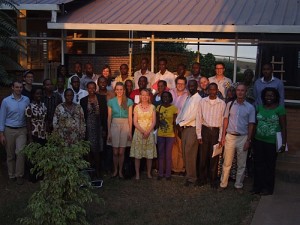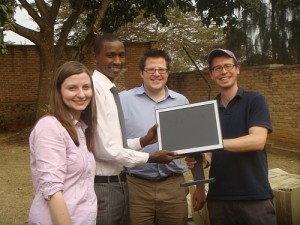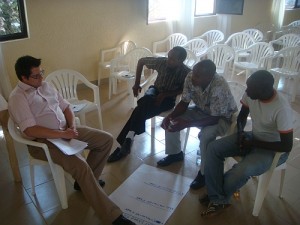
This is a guest blog post by Will Goodhand, a participant on Project Umubano, the international social action programme of the UK Conservative Party, which worked with Survivors Fund (SURF) to develop and deliver a capacity building toolkit and workshop with survivor’s organisations in Rwanda:
“How can we ensure that our two weeks in Rwanda deliver a lasting legacy?” is the constant focus of the Community project on Umubano. We are delighted to have set the bar high, after last year’s activity saw a new initiative resulting in 100 computers being presented to young survivors of the genocide, in addition to provision of new ongoing careers support. The Rwandan New Times reported on the handover ceremony, which took place during this year’s Umubano.

This year as last, we are working with SURF, the UK and Rwanda-based charity which fundraises and carries out projects to improve the lives of genocide survivors. Whilst last year’s project focused on preparing students for the world of employment (and inspiring them to create opportunities through internships and small businesses), 2010 has taken a different focus.
The legacy of the 1994 genocide still hangs heavy amongst survivors, many of whom lost all members of their family during the atrocities. Particularly in western Rwanda, women who were widowed and often infected with HIV during the genocide are still struggling to find proper medical and trauma treatment. In this context, SURF briefed us that there are opportunities for the many genocide survivors’ charities in Rwanda that they are not currently equipped to take full advantage of.
We spent Week One learning from the organisations themselves about their strengths and weaknesses, and – crucially – spending time with potential donors, both Rwandan and international, to clearly identify what they need to see in order to award their funds.
It is impossible to listen to the students we meet without being utterly moved to hear how they have formed ‘families’ to replace their parents who were killed in the genocide. I marvel at the ingenuity and care for each other as they discuss how they, typical age 23, take on the role of, say, ‘father’ to another student of similar age, in order to create a vital compassionate structure of mutual support. The young age of these students, who will do whatever is needed to support one another – in one case raising $2,000 so a girl could have the surgery she needed – is staggering, and utterly humbling. In the only word I could summon to express our regard for them: “Respect”.

It is just as remarkable to hear of their enterprise in establishing businesses, their absolute determination being that survivors become self-sufficient. In the midst of all that they do, it is hardly surprising that their focus is sometimes elsewhere than the mix of science and art required to win funding from non-governmental organisations and international bodies such as the UN.
With this in mind, the Community project team have very rapidly moved into the production phase – writing a manual covering everything that the survivors’ organisations need to know in order to succeed in communicating their message, target their fundraising, and monitor and evaluate their activities to ensure they win funding next time around.
We knew last year that having all the information written down is only part of the story. Lively workshops are the secret to really helping the audience to engage especially for the benefit of those whose English is weaker.
Our workshops with survivors’ charities this year boast a mix of a mini-lecture on the basics, followed by group exercises – and even role-plays to add a breath of fresh air. Last year, my gold lamé shirt was, amongst other more substantive gaffes, the mainstay of a sketch on ‘how not to do a job interview’, and it has been pressed into gaudy, horrifying service once again, this time to illustrate the questionable spending of funds.
We hope and believe that when we depart Kigali we will have done our own part towards building the capacity of these vital organisations, and left behind not just literature, but also skills, and an impetus to drive things forward. The focus of our final day will be on shaping strategic recommendations for those who remain, continuing their brilliant work in this beautiful, utterly enthralling country.
Will Goodhand is a Conservative Ward Chairman in inner London. This is his second year on Project Umubano.
To support survivors of the genocide in Rwanda through the Survivors Fund (SURF), please donate here.

Capacity Building Tools developed:
1. The Toolkit
2. Guidelines for a Great Fundraising Meeting
3. Communications planning template
4. Action plan template
5. Field Visit Report template
6. A guide to financial reporting
7. Monitoring and evaluation checklist
8. Monitoring and evaluation indicators
9. Glossary of Terms
